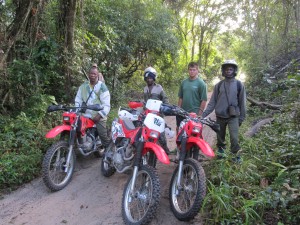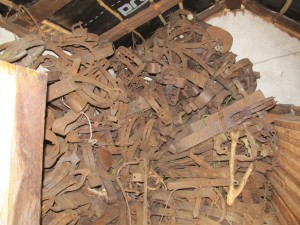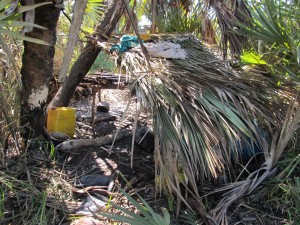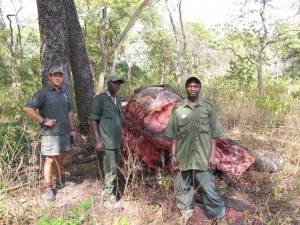
This elite anti-poaching team helps patrol the more than 1.3 million square miles of Coutada 11 and 12 in the Zambeze Delta Region. Combined with teams that patrol on foot, these brave men face extremely tough conditions in the bush to combat poachers. Though poaching is still a challenge, wildlife populations have bounced back remarkably well since these efforts were initiated. U.S. Military special operators could learn from these determined men.

A portion of the leg-hold traps the anti-poaching team has confiscated in the past year. These leg-hold traps are called Jennies and are made from old car door springs. Wire snares are far more prevalent because they are easier to make and transport. Trapped animals are finished off with spears with blades fashioned from re-bar and set in a bamboo pole. Though crude, these spears will penetrate the hide of a buffalo or an elephant.

After they found and freed a female Reedbuck caught by the neck in a wire snare, Gorchie, Albino and Poen were able to locate this extremely well-concealed poacher’s camp. They confiscated a considerable amount of meat and supplies before burning the camp. The poachers had walked more than 30 miles to set up this operation. Meat poachers kill many animals they never recover and can kill an astounding number of animals ranging from small antelope to lions and buffalo.
Close Call During Research Visit for Sequel to Staying Alive- How to Act Fast and Survive Deadly Encounters
Research for the sequel for Staying Alive – How to Act Fast and Survive Deadly Encounters has been a most interesting experience thus far. During the past two weeks, I have had the privilege to interview and observe three of the most fearless men I have ever met. I also had the opportunity to observe them operate under pressure in a situation that was likely more dangerous than any I faced in twenty years as a law enforcement officer.
Relevance to School Crisis Preparedness
The first in a series of interviews with men and women who must routinely handle life and death situations, this experience occurred in the forests and swamps of Sofala Province of Mozambique. While their work bears little resemblance to the field of education at first glance, they provided valuable lessons for school and public safety officials here in the United States. This interview did not involve S.W.A.T. officers or military special operators. Though I will also be interviewing these types of experts for the project, this effort focused on three men who make very different types of high-stakes decisions in an environment where emergency assistance is typically hours if not days away when catastrophe strikes.
Close Encounter
I knew the trip would be an adventure, I did not anticipate that a series of sudden shifts in the wind would result in our group being surrounded on two sides by a large heard of Cape Buffalo. Weighing in at more than 1,500 pounds, Cape Buffalo are one of the most dangerous animals on the continent. Having the fringes of a heard of about 150 of these massive beasts 6-8 yards from our group in heavy cover could have resulted in a violent and grisly death for all four of us had these men not shown amazing control.
Life-saving Lessons from the bush
Sadly, I also had the opportunity to observe these men attempt to track a group of poachers who had hacked off the tusks of a large bull elephant. Unfortunately, the poachers had a full-day head start and had made it to the nearest town before we were able to take up the track.

Poen, Gorchie and Albino with the carcass of an old bull elephant. Though they were able to track the team of poachers, it readily became apparent from the age of their tracks that they had already made their escape.
I was able to learn quite a bit about how critical trust between team mates is when faced with imminent and severe danger. I was also blessed to be able to observe first-hand just how well experts can retain their composure under these types of trying conditions. I am looking forward to the interviews with other types of experts who are among the best in the world at staying alive and saving the lives of others.


